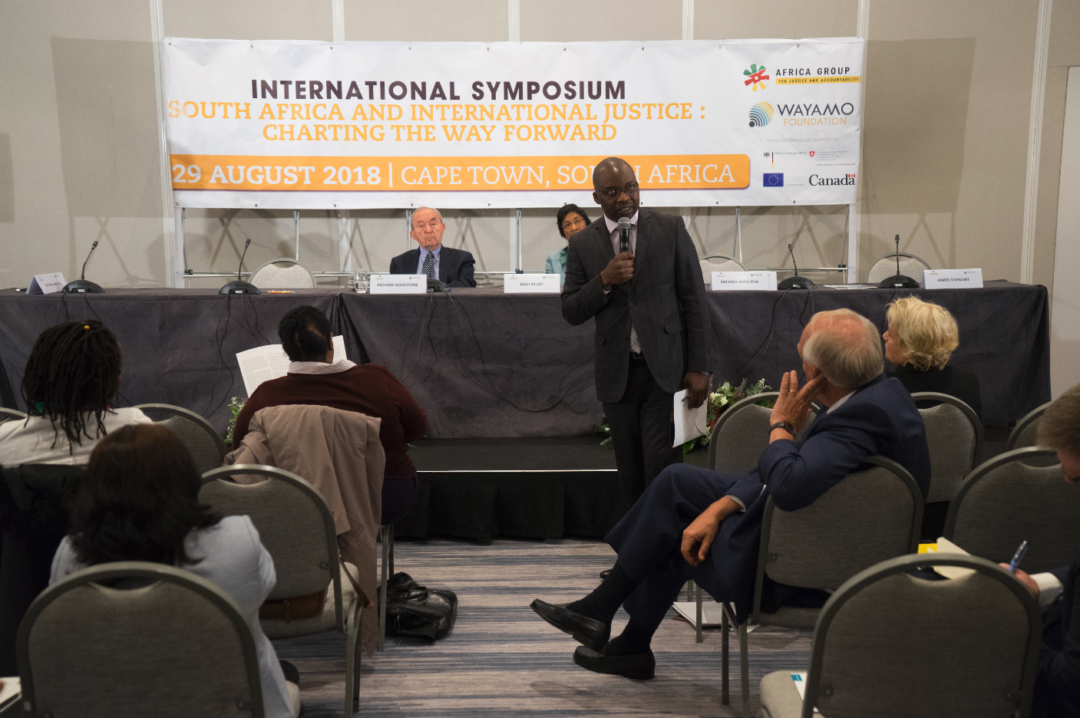Article by Carien du Plessis, published on 29 August 2018 in the Daily Maverick.
Justice Minister Michael Masutha has admitted that the Brics summit in Johannesburg last month “almost collapsed” because a group of South African lawyers threatened legal action against some heads of state attending the gathering.
Masutha has also said South Africa’s obligations under the Rome Statute as a member of the International Criminal Court (ICC) stood in the way of government’s international relations and diplomatic work.
Masutha reacted to scathing criticism by judges and the deputy prosecutor of the ICC, James Stewart, against a decision by the South African government to leave the court.
They were at a symposium on international justice on Wednesday, organised by the Wayamo Foundation and the Africa Group for Justice and Accountability.
Masutha told delegates that India threatened to withdraw from the recent Brics summit in Johannesburg should South Africa’s National Prosecuting Authority decide to arrest and prosecute Prime Minister Narendra Modi after the South African Kashmiri Action Group and the Muslim Lawyers’ Association asked the body to investigate “war crimes” during Modi’s governance of Jammu and Kashmir.
This followed the debacle three years ago around Sudanese President Omar al-Bashir’s attendance of the African Union summit in Johannesburg.
Read: Behind the scenes diplomatic wrangling with Putin and Modi threatens to derail Brics summit
Diplomatic immunity law ‘in a state of flux’
A court ruled that government failed in its obligations to arrest Al-Bashir as he was wanted by the ICC on charges of genocide and crimes against humanity.
Referring to the Modi case, Masutha said: “We almost had a complete derailing of proceedings of the impending settling of the Brics summit because of this”.
He said as long as “current legal arrangements” were in place, South Africa’s diplomatic immunity law was “in a state of flux, to put it mildly, or even crisis, and we cannot sit back and do nothing about it”.
With reference to previous points raised during the discussion that international justice also promoted peace, Masutha said: “It’s not just about our quest to promote peace in Africa and elsewhere, but it’s also about the reality that we are part of a global community and part of a global society, who are concerned with advancing development international objectives that promote our own domestic interest such as Brics.”
He said if legal obligations obstructed these commitments, it would not be helping the people of South Africa.
Masutha said government had “no qualms about civil society asserting themselves” by taking government to court, because such litigation pointed out “flaws in our laws”.
‘Hypocrisy of superpowers’
“It’s a good thing, because in that way you are pointing to what we have to do to correct [it] in order to achieve our national priorities.”
Masutha said some legislation stood in the way of South Africa’s diplomacy.
“South Africa cannot go back to the status of pariah state where other countries will shy away from visiting it if to do so would put their heads of state in a state of legal uncertainty and in fear of being arrested and prosecuted in South Africa when they are sitting heads of state.
“I don’t think people have paused to reflect on the consequences of such a situation.”
Read more: NPA declines to arrest and prosecute Indian prime minister
He said Al-Bashir had just been re-elected by Sudanese voters.
“Were you actually really realistically expecting us to effectively effect a change of government in the Sudan by going against the will of the people in Sudan by arresting him?” he asked.
He added that this hasn’t ever been done by any of the world’s superpowers.
“I’m just worried that there’s an element of hypocrisy here. It’s time we reflected on the position of other, more senior nations in the world, and what their attitude is.”
Decision to withdraw ‘taken lightly’
Stewart earlier said the withdrawal of South Africa from the ICC, which it had helped found, would be a blow to the international body.
Former United Nations High Commissioner for Human Rights Navi Pillay said South Africa’s decision to withdraw from the ICC “was taken lightly if you look at the context, that it has taken 50 years to get to where we are … and seemingly one individual is being protected here”.
She also said the Al-Bashir case was not unique, as former United States president George Bush has had to cancel a trip to Switzerland (in 2011) after human rights groups said they would call for his arrest for the alleged mistreatment of suspected militants at the Guantanamo Bay prison.
The ANC resolved at its conference in December that South Africa should withdraw from the ICC, and a parliamentary process in this regard is currently underway.


